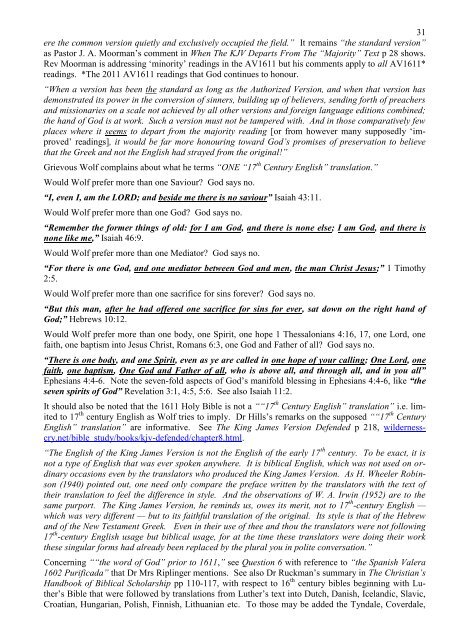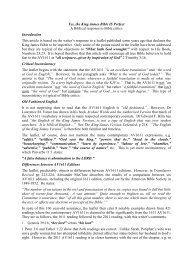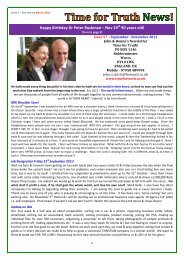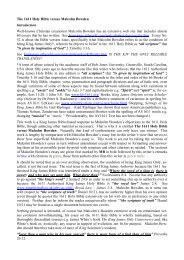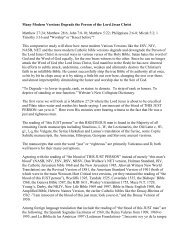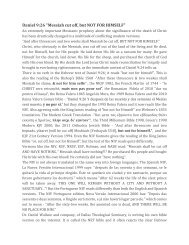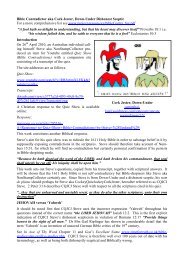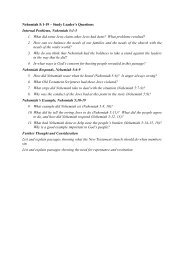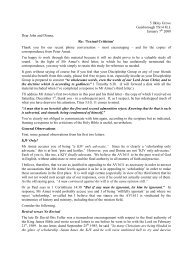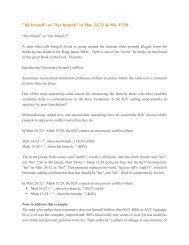A Grievous Wolf - Time for Truth
A Grievous Wolf - Time for Truth
A Grievous Wolf - Time for Truth
Create successful ePaper yourself
Turn your PDF publications into a flip-book with our unique Google optimized e-Paper software.
31<br />
ere the common version quietly and exclusively occupied the field.” It remains “the standard version”<br />
as Pastor J. A. Moorman’s comment in When The KJV Departs From The “Majority” Text p 28 shows.<br />
Rev Moorman is addressing ‘minority’ readings in the AV1611 but his comments apply to all AV1611*<br />
readings. *The 2011 AV1611 readings that God continues to honour.<br />
“When a version has been the standard as long as the Authorized Version, and when that version has<br />
demonstrated its power in the conversion of sinners, building up of believers, sending <strong>for</strong>th of preachers<br />
and missionaries on a scale not achieved by all other versions and <strong>for</strong>eign language editions combined;<br />
the hand of God is at work. Such a version must not be tampered with. And in those comparatively few<br />
places where it seems to depart from the majority reading [or from however many supposedly ‘improved’<br />
readings], it would be far more honouring toward God’s promises of preservation to believe<br />
that the Greek and not the English had strayed from the original!”<br />
<strong>Grievous</strong> <strong>Wolf</strong> complains about what he terms “ONE “17 th Century English” translation.”<br />
Would <strong>Wolf</strong> prefer more than one Saviour? God says no.<br />
“I, even I, am the LORD; and beside me there is no saviour” Isaiah 43:11.<br />
Would <strong>Wolf</strong> prefer more than one God? God says no.<br />
“Remember the <strong>for</strong>mer things of old: <strong>for</strong> I am God, and there is none else; I am God, and there is<br />
none like me,” Isaiah 46:9.<br />
Would <strong>Wolf</strong> prefer more than one Mediator? God says no.<br />
“For there is one God, and one mediator between God and men, the man Christ Jesus;” 1 Timothy<br />
2:5.<br />
Would <strong>Wolf</strong> prefer more than one sacrifice <strong>for</strong> sins <strong>for</strong>ever? God says no.<br />
“But this man, after he had offered one sacrifice <strong>for</strong> sins <strong>for</strong> ever, sat down on the right hand of<br />
God;” Hebrews 10:12.<br />
Would <strong>Wolf</strong> prefer more than one body, one Spirit, one hope 1 Thessalonians 4:16, 17, one Lord, one<br />
faith, one baptism into Jesus Christ, Romans 6:3, one God and Father of all? God says no.<br />
“There is one body, and one Spirit, even as ye are called in one hope of your calling; One Lord, one<br />
faith, one baptism, One God and Father of all, who is above all, and through all, and in you all”<br />
Ephesians 4:4-6. Note the seven-fold aspects of God’s manifold blessing in Ephesians 4:4-6, like “the<br />
seven spirits of God” Revelation 3:1, 4:5, 5:6. See also Isaiah 11:2.<br />
It should also be noted that the 1611 Holy Bible is not a ““17 th Century English” translation” i.e. limited<br />
to 17 th century English as <strong>Wolf</strong> tries to imply. Dr Hills’s remarks on the supposed ““17 th Century<br />
English” translation” are in<strong>for</strong>mative. See The King James Version Defended p 218, wildernesscry.net/bible_study/books/kjv-defended/chapter8.html.<br />
“The English of the King James Version is not the English of the early 17 th century. To be exact, it is<br />
not a type of English that was ever spoken anywhere. It is biblical English, which was not used on ordinary<br />
occasions even by the translators who produced the King James Version. As H. Wheeler Robinson<br />
(1940) pointed out, one need only compare the preface written by the translators with the text of<br />
their translation to feel the difference in style. And the observations of W. A. Irwin (1952) are to the<br />
same purport. The King James Version, he reminds us, owes its merit, not to 17 th -century English —<br />
which was very different — but to its faithful translation of the original. Its style is that of the Hebrew<br />
and of the New Testament Greek. Even in their use of thee and thou the translators were not following<br />
17 th -century English usage but biblical usage, <strong>for</strong> at the time these translators were doing their work<br />
these singular <strong>for</strong>ms had already been replaced by the plural you in polite conversation.”<br />
Concerning ““the word of God” prior to 1611,” see Question 6 with reference to “the Spanish Valera<br />
1602 Purificada” that Dr Mrs Riplinger mentions. See also Dr Ruckman’s summary in The Christian’s<br />
Handbook of Biblical Scholarship pp 110-117, with respect to 16 th century bibles beginning with Luther’s<br />
Bible that were followed by translations from Luther’s text into Dutch, Danish, Icelandic, Slavic,<br />
Croatian, Hungarian, Polish, Finnish, Lithuanian etc. To those may be added the Tyndale, Coverdale,


